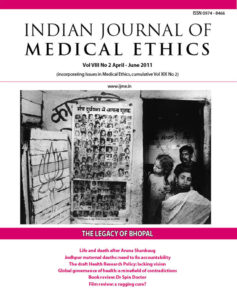
In a path breaking judgment, the Supreme Court of India decided that passive euthanasia can be practised legally in this country. Aware that it was entering a political and social minefield, the court trod warily but opened the gate to a more liberal, yet rightly cautious approach. One of our editorials looks at the ethical implications of this case.
Ironically, while the right to die in certain circumstances has been accepted in our country, the right to live, and to get the quality of healthcare to be able to do so, is still elusive. 18 young women who went into reputed public hospitals in Jodhpur hoping to give birth in a safe and secure environment never went back home. Now, heads are rolling in the usual witch hunt; but are they the right ones? Will this punitive exercise ensure that such deaths don’t occur, again and again? This shameful series of lapses is analysed in another editorial.
Can standards of care in research be universal and immutable all over the globe? Journals like this one must keep the debate going between those trying to render the best care in adverse circumstances and those who believe they are falling short, so that the ethical issues are laid bare. An article looks at this burning issue in international research ethics. Another commentator analyses the shift in world health policy from the ‘international’, in which national goals played a part, to the ‘global’ in which ‘philanthropic’ corporates and NGOs may dole out or withdraw funds at will.
Commercial interests continue to build their honey traps and several of our number regularly fall into them. One such example, of orthopaedic devices and how doctors are induced to recommend them, is dealt with here. Another article tackles the casual and unthinking dependence on technologies which do not serve the intended purpose.
Cover photograph by Raghu Rai, courtesy of bhopal.net
